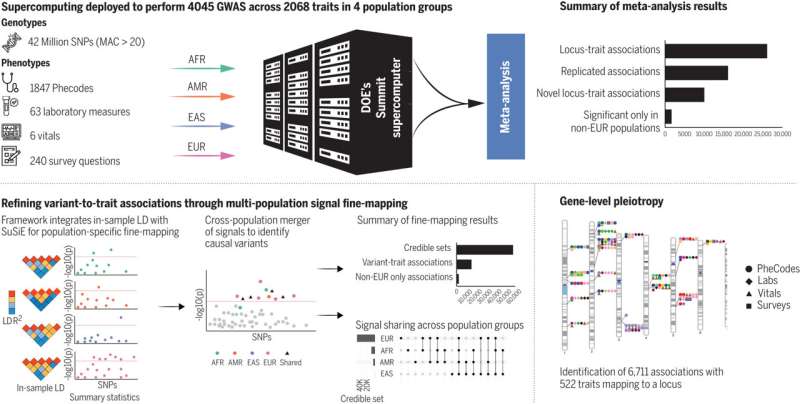This article has been reviewed according to Science X's editorial process and policies. Editors have highlighted the following attributes while ensuring the content's credibility:
fact-checked
peer-reviewed publication
trusted source
proofread
Genetic study highlights importance of diversity in understanding health disparities

The majority of genetic studies focus on people of European descent, which limits the understanding of how genes influence health in other populations. Now researchers at the Perelman School of Medicine at the University of Pennsylvania and the Corporal Michael J. Crescenz VA Medical Center have partnered with a team of researchers at the Department of Veterans Affairs and the Department of Energy Oak Ridge and Argonne National Laboratories to conduct large-scale studies with diverse groups to better understand the genetic factors that influence health and disease.
The Million Veteran Program (MVP), for example, includes people from various backgrounds along with their detailed health records. A study published in Science has analyzed genetic data from 635,969 veterans and 2,068 traits, and identified a total of 26,049 associations between specific genetic variants and various traits or health conditions.
The study, one of the largest of its kind, utilized data from MVP, a longitudinal study of U.S. veterans, with over 29% of the participants being of non-European ancestry. Researchers identified 13,672 specific regions in DNA that are associated with one or more traits, such as physical characteristics or health conditions. These regions, known as genetic risk areas, can influence the likelihood of a person having certain traits or developing certain diseases.
"Understanding the genetic factors underlying health disparities is crucial for developing targeted interventions and treatments that can benefit all people, regardless of their background," said the study's corresponding author, Scott Damrauer, MD, an associate professor of Genetics at Penn and vascular surgeon at the Crescenz VA. "By uncovering these genetic insights across diverse populations, we are taking significant steps towards a more personalized and inclusive approach to health care."
Specifically, the study discovered population-specific signals, such as the rs72725854 variant at the PCAT2 locus associated with prostate cancer risk, predominantly observed in African-American men. It also revealed a novel gout risk variant, rs35965584, in the African-American population group, alongside the known variant rs2231142.
The study showed that the genetics of most traits are similar between groups of diverse people, but certain groups do have their own distinct genetic features. They were able to find these differences more accurately, especially in African-American and mixed ancestry groups, thanks to improvements in how they analyze DNA, like fine mapping, which allows researchers to identify the exact genetic changes responsible for a particular trait or condition. The findings highlight the importance of including diverse genetic backgrounds in understanding the genetic causes of health disparities.
"Our work demonstrates overwhelmingly more similarities than differences in genetic associations between groups," said first author Anurag Verma, Ph.D., an assistant professor of Translational Medicine and Human Genetics and VA MVP researcher. "However, the unique genetic variations identified in diverse populations provide critical insights into health disparities and have significant implications for precision medicine."
"Biobanks like the MVP serve as a pivotal resource for generating new genetic association resources and insights. The findings from this inclusive and diverse study lay the foundation for future genetic research that will, first and foremost, help us better care for our nation's veterans—as well as their families, caregivers, survivors, and other non-Veterans. This was only possible due to the altruism and the diversity of participating veterans," said VA's MVP Program Director, Sumitra Muralidhar, Ph.D.
More information: Anurag Verma, Diversity and scale: genetic architecture of 2,068 traits in the VA Million Veteran Program, Science (2024). DOI: 10.1126/science.adj1182





















